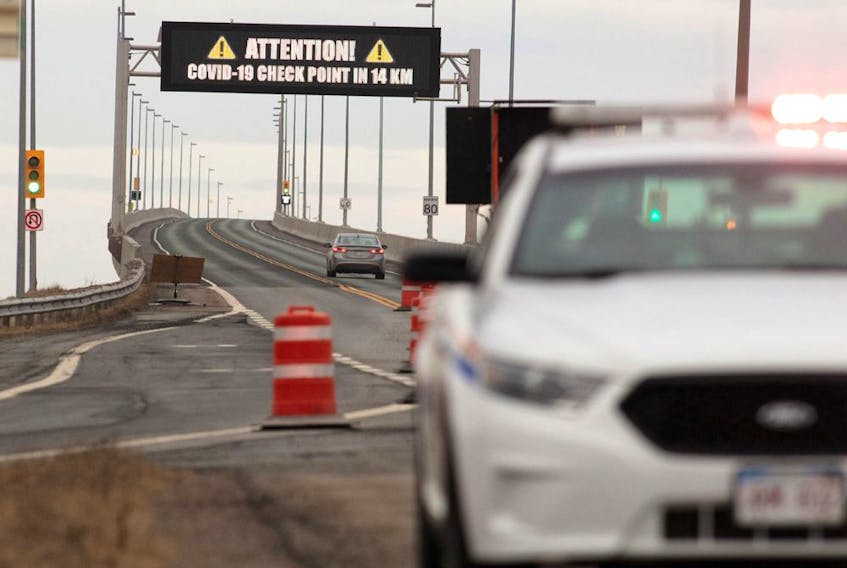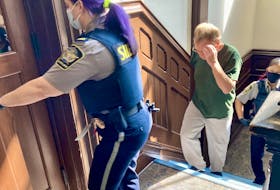Highlights from today:
- P.E.I. and NL will require self-isolation for travellers entering those provinces from the other Atlantic provinces
- Nova Scotia announces 11 new cases among tests performed on Sunday
- New Brunswick has 15 new cases and one new death due to COVID-19, the province's seventh
Two of the region's premiers have burst the Atlantic bubble, at least for the next two weeks, as Prince Edward Island and Newfoundland and Labrador announced implementation of travel restrictions.
New Brunswick and Nova Scotia will not follow suit, however, choosing to instead stress caution in considering non-essential travel.
Newfoundland and Labrador Premier Dr. Andrew Furey announced the decision in a video update on Monday morning.
“After careful consideration and consultation, I have made the tough decision to implement the circuit breaker,” he said. “Effective 12:01 a.m. on Wednesday, Nov. 25, 2020, people arriving in Newfoundland and Labrador from within the Atlantic bubble will be required to self-isolate for 14 days. This is not an easy decision.
“Implementing this change for a two-week period is an effort to avoid a full lockdown.”
Newfoundland reported two new cases on Monday, with a total of 23 active cases.
P.E.I. Premier Dennis King also announced the island province will implement restrictions. Anyone travelling to the province will have to self-isolate for 14 days.
In their own video update on Monday, King and the island's chief medical officer, Dr. Heather Morrison, said there was one new case in P.E.I., involving a person who had travelled outside the Atlantic bubble, for a total of two active cases. But Morrison said she is concerned COVID-19 is already on P.E.I. in larger numbers.
“We are announcing that effective Tuesday, Nov. 24, at 12:01 a.m., P.E.I.'s participation in the Atlantic bubble will be suspended for two weeks, at least until Dec. 7,” Morrison said.
Non-island residents will once again have to apply for pre-travel approval before crossing to P.E.I., including a plan for self-isolation, Morrison said.
“People who need to travel within Atlantic Canada for essential services – medical appointments, transportation of goods, pick-up of students at university – and they return to P.E.I.within 24 hours, will not be required to self-isolate as long as they follow certain measures and enhanced infection-prevention control measures during that period of time,” she said.
New Brunswick premier Blaine Higgs and the province's Chief Medical Officer of Health Dr. Jennifer Russell announced online on Monday afternoon that they will not be requiring self-isolation for Atlantic region travellers, despite there being 15 new cases for a total of 89 active in New Brunswick, and one new death.
“In the case of between ourselves and Nova Scotia, we both believe that our priority needs to be in how we manage adherence to public health rules,” Higgs said. “How we basically enforce those rules within our communities, and in the case of New Brunswick, we know where our current situation – the problems are, and the opportunities – and that's in southern New Brunswick. In the case of Nova Scotia, Premier (Stephen) McNeil knows it's the Halifax region, so the message from both of us is certainly – and it's actually from all of us – is stay at home. And support your local businesses but stay within your own province.”
A spokeswoman for McNeil's office said at lunchtime that the province is sticking with just issuing a reminder to limit non-essential travel at this point, not implementing further restrictions.
An emailed statement from McNeil reiterated that position while urging people to limit travel for the next two weeks.
“I respect the decision of the provinces of Prince Edward Island and Newfoundland and Labrador to take further steps at this time,” McNeil said in the statement.
“Our border with New Brunswick continues to be monitored. There are a number of people on both sides of our shared border who drive back and forth for work or other essential reasons, and they can continue to do so. But for anyone considering a shopping trip or other non-essential travel, we are asking you not to. This is another step we can take to slow the spread of COVID-19.”
Meanwhile, Nova Scotia authorities announced 11 new cases on Monday from testing performed on Sunday.
Those are in addition to 11 found in testing on Saturday, bringing the total known active cases to 51.
Gathering limits have been tightened in HRM and Hants County to five from 10 without social distancing as the central zone grapples with the cluster. Households can only have five visitors at a time and households with more than five members can only go outside in groups of no more than five people.
Indoor gatherings for events with social distancing are limited to 50 per cent of the venue's capacity to a maximum of 100, or 150 people outdoors with social distancing. Informal gatherings are limited to 25 people.
Auburn Drive High School and Graham Creighton Junior High are both closed until Dec. 7 after students tested positive last week.
The Atlantic bubble, allowing travellers to move between New Brunswick, Nova Scotia, P.E.I. and Newfoundland without requiring self-isolation, was put in place on July 3 as the first wave of the pandemic faded in the region.
More to come
Comments are open on this article to members at SaltWire.com









